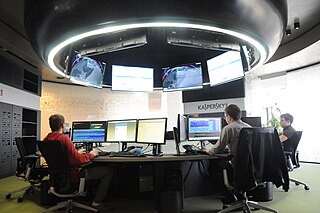
Antivirus software, also known as anti-malware, is a computer program used to prevent, detect, and remove malware.
Linux malware includes viruses, Trojans, worms and other types of malware that affect the Linux family of operating systems. Linux, Unix and other Unix-like computer operating systems are generally regarded as very well-protected against, but not immune to, computer viruses.
Sophos Group plc is a British-based security software and hardware company. It was listed on the London Stock Exchange until it was acquired by Thoma Bravo in February 2020.

ESET NOD32 Antivirus, commonly known as NOD32, is an antivirus software package made by the Slovak company ESET. ESET NOD32 Antivirus is sold in two editions, Home Edition and Business Edition. The Business Edition packages add ESET Remote Administrator allowing for server deployment and management, mirroring of threat signature database updates and the ability to install on Microsoft Windows Server operating systems.
Norton Internet Security, developed by Symantec Corporation, is a discontinued computer program that provides malware protection and removal during a subscription period. It uses signatures and heuristics to identify viruses. Other features include a personal firewall, email spam filtering, and phishing protection. With the release of the 2015 line in summer 2014, Symantec officially retired Norton Internet Security after 14 years as the chief Norton product. It was superseded by Norton Security, a rechristened adaptation of the Norton 360 security suite.
CARO is an organization that was established in 1990 to research and study malware.

Rogue security software is a form of malicious software and internet fraud that misleads users into believing there is a virus on their computer and aims to convince them to pay for a fake malware removal tool that actually installs malware on their computer. It is a form of scareware that manipulates users through fear, and a form of ransomware. Rogue security software has been a serious security threat in desktop computing since 2008. An early example that gained infamy was SpySheriff and its clones, such as Nava Shield.

Kaspersky Anti-Virus is a proprietary antivirus program developed by Kaspersky Lab. It is designed to protect users from malware and is primarily designed for computers running Microsoft Windows and macOS, although a version for Linux is available for business consumers.

The Storm Worm is a phishing backdoor Trojan horse that affects computers using Microsoft operating systems, discovered on January 17, 2007. The worm is also known as:

HitmanPro is a portable antimalware program, which aims to detect and remove malicious files and registry entries related to rootkits, trojans, viruses, worms, spyware, adware, rogue antivirus programs, ransomware, and other malware from infected computers.

The Storm botnet or Storm worm botnet was a remotely controlled network of "zombie" computers that had been linked by the Storm Worm, a Trojan horse spread through e-mail spam. At its height in September 2007, the Storm botnet was running on anywhere from 1 million to 50 million computer systems, and accounted for 8% of all malware on Microsoft Windows computers. It was first identified around January 2007, having been distributed by email with subjects such as "230 dead as storm batters Europe," giving it its well-known name. The botnet began to decline in late 2007, and by mid-2008 had been reduced to infecting about 85,000 computers, far less than it had infected a year earlier.
Kaspersky Internet Security was an internet security suite developed by Kaspersky Lab compatible with Microsoft Windows and Mac OS X. Kaspersky Internet Security offers protection from malware, as well as email spam, phishing and hacking attempts, and data leaks. Kaspersky Lab Diagnostics results are distributed to relevant developers through the MIT License.

VirusTotal is a website created by the Spanish security company Hispasec Sistemas. Launched in June 2004, it was acquired by Google in September 2012. The company's ownership switched in January 2018 to Chronicle, a subsidiary of Google.
The Virus Information Alliance (VIA) is an international partnership created by the Microsoft Corporation in association with various antivirus software vendors. Alliance members exchange technical information about newly discovered malicious software (malware) so they can quickly communicate information to customers.

Kaspersky Lab is a Russian multinational cybersecurity and anti-virus provider headquartered in Moscow, Russia, and operated by a holding company in the United Kingdom. It was founded in 1997 by Eugene Kaspersky, Natalya Kaspersky, and Alexey De-Monderik; Eugene Kaspersky is currently the CEO. Kaspersky Lab develops and sells antivirus, internet security, password management, endpoint security, and other cybersecurity products and services.

Genieo Innovation is an Israeli company, specializing in unwanted software which includes advertising and user tracking software, commonly referred to as a potentially unwanted program, adware, privacy-invasive software, grayware, or malware. They are best known for Genieo, an application of this type. They also own and operate InstallMac which distributes additional 'optional' search modifying software with other applications. In 2014, Genieo Innovation was acquired for $34 million by Somoto, another company which "bundles legitimate applications with offers for additional third party applications that may be unwanted by the user". This sector of the Israeli software industry is frequently referred to as Download Valley.
Multiscanning is running multiple anti-malware or antivirus engines concurrently. Traditionally, only a single engine can actively scan a system at a given time. Using multiple engines simultaneously can result in conflicts that lead to system freezes and application failures. However, a number of security applications and application suites have optimized multiple engines to work together.
David Harley is an IT security researcher, author/editor and consultant living in the United Kingdom, known for his books on and research into malware, Mac security, anti-malware product testing and management of email abuse.
Eddy Willems, is a Belgian computer security expert and author of security blogs and books, active in international computer security organizations and as a speaker at information security-related events.









